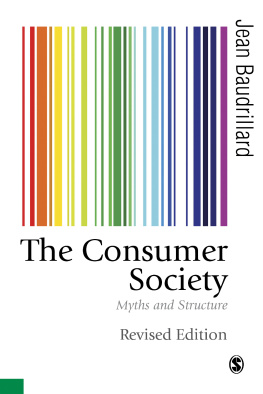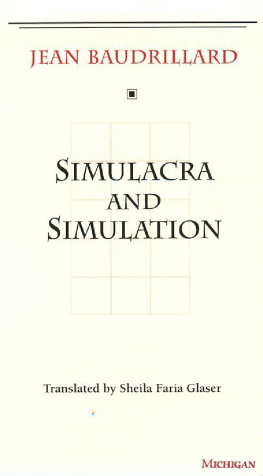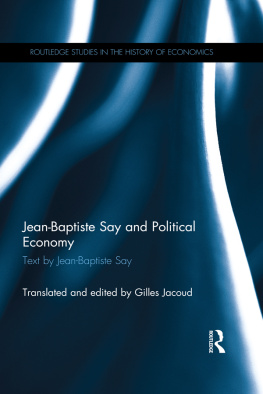Jean Baudrillard - For a Critique of the Political Economy of the Sign
Here you can read online Jean Baudrillard - For a Critique of the Political Economy of the Sign full text of the book (entire story) in english for free. Download pdf and epub, get meaning, cover and reviews about this ebook. year: 0, publisher: Penguin Random House LLC (Publisher Services), genre: Romance novel. Description of the work, (preface) as well as reviews are available. Best literature library LitArk.com created for fans of good reading and offers a wide selection of genres:
Romance novel
Science fiction
Adventure
Detective
Science
History
Home and family
Prose
Art
Politics
Computer
Non-fiction
Religion
Business
Children
Humor
Choose a favorite category and find really read worthwhile books. Enjoy immersion in the world of imagination, feel the emotions of the characters or learn something new for yourself, make an fascinating discovery.
- Book:For a Critique of the Political Economy of the Sign
- Author:
- Publisher:Penguin Random House LLC (Publisher Services)
- Genre:
- Year:0
- Rating:4 / 5
- Favourites:Add to favourites
- Your mark:
- 80
- 1
- 2
- 3
- 4
- 5
For a Critique of the Political Economy of the Sign: summary, description and annotation
We offer to read an annotation, description, summary or preface (depends on what the author of the book "For a Critique of the Political Economy of the Sign" wrote himself). If you haven't found the necessary information about the book — write in the comments, we will try to find it.
For a Critique of the Political Economy of the Sign — read online for free the complete book (whole text) full work
Below is the text of the book, divided by pages. System saving the place of the last page read, allows you to conveniently read the book "For a Critique of the Political Economy of the Sign" online for free, without having to search again every time where you left off. Put a bookmark, and you can go to the page where you finished reading at any time.
Font size:
Interval:
Bookmark:

CRITIQUE OF
THE POLITICAL
ECONOMY OF
THE SIGN
CRITIQUE OF
THE POLITICAL
ECONOMY OF
THE SIGN
Jean Baudrillard
Translated with an Introduction
by Charles Levin

This edition first published by Verso 2019
First published by Telos Press 1981
Translation Charles Levin 1981, 2019
All rights reserved
The moral rights of the authors have been asserted
1 3 5 7 9 10 8 6 4 2
Verso
UK: 6 Meard Street, London W1F 0EG
US: 20 Jay Street, Suite 1010, Brooklyn, NY 11201
versobooks.com
Verso is the imprint of New Left Books
ISBN-13: 978-1-78873-483-7
ISBN-13: 978-1-78873-485-1 (UK EBK)
ISBN-13: 978-1-78873-484-4 (US EBK)
British Library Cataloguing in Publication Data
A catalogue record for this book is available from the British Library
Library of Congress Cataloging-in-Publication Data
A catalog record for this book is available from the Library of Congress
Typeset in Garamond by MJ&N Gavan, Truro, Cornwall
Printed and bound by CPI Group (UK) Ltd, Croydon, CR0 4YY
I
The essays in this volume span a period, the late 1960s and early 1970s, when Jean Baudrillard was preparing three other books for publication. In the first, Systme des objets (1968), he took literally and developed at length Lukacs observation, at the beginning of his famous essay on reification, that the problem of commodities [is] the central, structural problem of capitalist society in all its aspects. For Baudrillard, as for his predecessor, this meant that the commodity was not just a problem in economics, but the nucleus of a semantic crisis which reticulated throughout the entire social system.
Lukacs had gone on to say that only in this case can the structure of commodity-relations be made to yield a model of all the objective forms of bourgeois society together with all the subjective forms corresponding to them. Here, he elaborated on the conclusion of his previous book that consumption has become a kind of labor, an active manipulation of signs, a sort of bricolage in which the individual desperately attempts to organize his privatized existence and invest it with meaning. But the consumer proceeds through this strange world metonymically, as it were. What is consumed is not the object itself, but the system of objects, the idea of a relation that is actually no longer lived, but abolished, abstracted and consumed by the signifying system itself, of which the commodity is only one kind of differential term. It is this very condition of semiosis, engendered by the universalization of commodity relations, which privatizes experience in the first place. As we consume the code, in effect, we reproduce the system.
Thus, the alleged consumer society surrounds itself with signs of abundance, but abolishes wealth itself, annihilates the experience of abundance, by aborting the concrete, relational dialectic of social interchange through which real abundance comes into existence, and wealth can be lived. Here, Baudrillard takes issue with Sartre. Scarcity is not an objective, quantifiable condition against which lives are acted out in struggle, against which societies erect greater and more (or less) humane barriers. Rather it is this competition, the struggle with necessity itself (a gross ideological form), and the mythic odyssey of growth with which society exorcises this demon, that actually produce scarcity as the very principle of social structure.
In 1972, the essays which appear in this volume were published as Pour une critique de lconomie politique du signe. Many of them condense what is elaborated in the earlier books, but rough sketches of the themes which will preoccupy the later works emerge as the sequence progresses.
I have chosen to append the word notes to the original title and to extend occasionally these introductory remarks to other works and writers subtending Baudrillards discourse.
II
The once supposedly autonomous subject [is] emptied of any content, until it finally becomes a mere name with nothing to denominate. The total transformation of each and every realm of being into a field of means leads to the liquidation of the subject who is supposed to use them. This gives modern industrialist society its nihilistic aspect.
Max Horkheimer, Eclipse of Reason
There is no revolutionary substance inhering in people and things, fermenting liberty and peace, as subject and object, reason and nature traverse the battlegrounds and no mans lands of history. There are no transcendental guarantees, as Marcuse once said; there is no exogenous dialectic. It has always been very tempting to stop right there, abjuring this religion without actually giving up the ghost, without abandoning the originalindeed the sourceof all transcendental guarantees. The revolution, after all, must go on, and if it wont by itself, then I, we, must make it go on. As Marcuse asked. Are you ready to take yourself as an autonomous subject, through your own revolutionary choice, independently of any historical mission, independently of all transcendental guarantees which, between you and me, are a lot of rubbish anyway, one of the luxuries dear Marx used to allow himself?
And, so we have the autonomous subject, making free choices, independently. This is an indispensable idea, so fundamental that if we do away with it completely, we explode any recognizable version of emancipation, as Habermas calls itnot to mention revolutionand implicitly, we abandon the possibility of critical theory.
A frequent problem with this notion of an autonomous subject has been that, of the many who have written in its name, not a few have written as if it were their nom de plume. Perhaps this fact explains, in part, the tyranny wrought, directly (or indirectly, through his epigones), by Marx himself. But Fichtean or Hegelian hubris is not the inevitable consequence of belief in a free and vigorous and creative subjectivity. Sartre did much to publicize the idea that nobody, neither the proletariat nor even he, in spite of his stature, could totalize the entire totality. Marcuse linked the idea of autonomy with a non-aggressive sensibility, rooting freedom in the negation of the split with nature, an explosion of vital needs, as he called it, which transcends the inculcated needs of neo-capitalism.
But if the needs of a radical sensibility are intended to recall a harmonious understanding of nature as subjectivity, they nevertheless take the form of categorical imperatives issuing from an imperious reason. As Marcuse himself insisted: The primary liberation cannot be spontaneous because such spontaneity would only express the values and goals derived from the established system. Self-liberation is self-education but as such it presupposes education by others Those who are educated have a commitment to use their knowledge to help men and women realize and enjoy their truly human capabilities. Now, perhaps this explains the need for critical theory (or perhaps it doesnt); but it certainly casts the entire project into the whirl of an intolerable circleone which is hardly resolved with appeals to the Second Thesis on Feuerbach. It is an intolerable circle not because it is a vicious circle, but because it is growing tiresome, and cannot be sustained indefinitely merely by being dubbed epistemological.
Font size:
Interval:
Bookmark:
Similar books «For a Critique of the Political Economy of the Sign»
Look at similar books to For a Critique of the Political Economy of the Sign. We have selected literature similar in name and meaning in the hope of providing readers with more options to find new, interesting, not yet read works.
Discussion, reviews of the book For a Critique of the Political Economy of the Sign and just readers' own opinions. Leave your comments, write what you think about the work, its meaning or the main characters. Specify what exactly you liked and what you didn't like, and why you think so.











